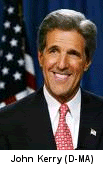Kerry, Feingold Demand Action On Forgotten War In Afghanistan
 Just as the United States Senate was dominated last week with the fight to raise the Federal Minimum Wage, the next few days will see a heated battle over what sentiments -- if any -- the Senate should formally express in opposition to George W. Bush's plan to escalate the Iraq war.
Just as the United States Senate was dominated last week with the fight to raise the Federal Minimum Wage, the next few days will see a heated battle over what sentiments -- if any -- the Senate should formally express in opposition to George W. Bush's plan to escalate the Iraq war.While that issue will dominate the woefully single-threaded media on Capitol Hill, a Senate resolution proposed by John Kerry (D-MA) is also very relevant to America's national security and should at least get some mention as it waits in the wings.
A couple of weeks ago, Kerry introduced S. RES. 34, which calls on the White House to start focusing on something vaguely related to the attacks of September 11 and beef up "…the efforts of the United States to defeat the Taliban and terrorist networks in Afghanistan."
Cosponsored by Senators Russ Feingold (D-WI), Joe Biden (D-DE) and Chris Dodd (D-CT), the resolution warns that Taliban activity is returning full-force to the region and that continuing to place that conflict in the back seat to Iraq will cause Afghanistan to "become what it was before the September 11, 2001 terrorist attacks, a haven for those who seek to harm the United States and a source of instability that threatens the security of the United States."
“While the Administration moves forward with its escalation plans for Iraq, it has failed to address deteriorating security conditions in Afghanistan.” Feingold said. “We should not be reducing our forces in Afghanistan. Instead, we should be strengthening our efforts to defeat a resurgent Taliban – the same movement that harbored and supported the terrorist elements that attacked our country on 9/11.”
Citing a number of statistics showing the steep decline of conditions in Afghanistan in just the last 18 months -- Taliban attacks on United States and allied forces increased from 1,558 in 2005 to 4,542 in 2006 and roadside bomb attacks more than doubled from 2005 to 2006 -- the resolution would make the following demands of Bush:
- Strengthen U.S. commitment to establishing long-term stability and peace in Afghanistan.
- Maintain or increase the total number of troops serving in Afghanistan and not sacrifice that effort to bolster America's failed presence in Iraq.
- Partner with the International Security Assistance Force and the government of Afghanistan and increase efforts to eradicate the Taliban, terrorist organizations, and criminal networks currently operating in Afghanistan.
- Increase economic assistance to Afghanistan for reconstruction, social and economic development, counter narcotics efforts and democracy promotion.
- Encourage members of the international community to deliver on their financial pledges to support development and reconstruction efforts in Afghanistan.
The resolution also stresses the need for greater U.S. military presence in Afghanistan by citing Secretary of Defense Robert Gates himself who, on January 15, 2007, said that there were "indications that the Taliban were planning a large spring offensive" against American troops and NATO forces in that country.
And Secretary of State Condoleezza Rice also reinforced the importance of a secure Afghanistan late last year saying "an Afghanistan that does not complete its democratic evolution and become a stable, terrorist-fighting state is going to come back to haunt us."
My guess is that this sounds pretty convincing to everyone but Bush and his clueless crew at 1600 Pennsylvania Avenue and it will take a strong vote in the Senate to force them to pay attention to the original "war on terror" that they seem to have forgotten. I'm sure American troops fighting in Afghanistan also appreciate being left to fend for themselves, while Bush tries to salvage his hideous legacy in Iraq.
Fortunately, Kerry's proposal has been referred to the Senate Foreign Relations Committee, where the Massachusetts Senator is a member and Joe Biden, one of the resolution's cosponsors, is the chairman -- so we know it will get a fair hearing in this Congress.
As he often does, Russ Feingold tied a nice bow around this whole thing by pointing out that, despite all their bluster about a "global war on terror," Team Bush has consistently avoided effective anti-terror measures worldwide in favor of a war about nothing in Iraq.
“When Afghanistan becomes a second priority or, as a senior military officer recently put it, an 'economy of force' operation, it offers a sobering example of this Administration’s misguided approach to the global fight against terrorist networks,” Feingold said. “Because of the Administration’s Iraq-centric foreign policies, we have neglected situations around the world with a direct impact on our national security, in Afghanistan, Somalia and other countries.”

















<< Home